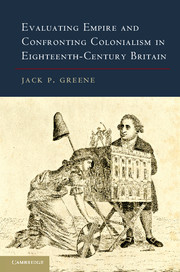Book contents
- Frontmatter
- Contents
- Preface Confronting Empire
- Prologue “Scene of a Foul Transaction”
- 1 “The Principal Cornucopia of Great-Britain's Wealth”
- 2 Outposts of “Loose Vagrant People”
- 3 “A Fabric at Once the Dread and Wonder of the World”
- 4 Arenas of “Asiatic Plunder”
- 5 Sites of Creolean Despotism
- 6 “A Fruitless, Bloody, Wasting War”
- 7 “This Voraginous Gulph of Hibernian Dependence”
- 8 A “Shadow of Our Former Glory”?
- Epilogue “Against Every Principle of Justice, Humanity, and Whatever is Allowed to be Right Among Mankind”
- Index
- References
3 - “A Fabric at Once the Dread and Wonder of the World”
The Languages of Imperial Grandeur, Liberty, Commerce, Humanity, and Justice and the American Challenge to Empire
Published online by Cambridge University Press: 05 June 2013
- Frontmatter
- Contents
- Preface Confronting Empire
- Prologue “Scene of a Foul Transaction”
- 1 “The Principal Cornucopia of Great-Britain's Wealth”
- 2 Outposts of “Loose Vagrant People”
- 3 “A Fabric at Once the Dread and Wonder of the World”
- 4 Arenas of “Asiatic Plunder”
- 5 Sites of Creolean Despotism
- 6 “A Fruitless, Bloody, Wasting War”
- 7 “This Voraginous Gulph of Hibernian Dependence”
- 8 A “Shadow of Our Former Glory”?
- Epilogue “Against Every Principle of Justice, Humanity, and Whatever is Allowed to be Right Among Mankind”
- Index
- References
Summary
Success in the Seven Years’ War altered the ways in which metropolitans spoke about empire. No longer was the emphasis so heavily upon trade. Defenders of the treaty that ended the war signaled the change in parliamentary debates in December 1762. “The value of our conquests…ought not to be estimated by present produce, but by their probable increase,” one speaker explained, and “neither ought the value of any country to be solely tried on its commercial advantages.” “Such ideas,” he said, were “rather [more] suited to a limited and petty commonwealth, like Holland, than to a great, powerful, and warlike nation” such as Britain. “Extent of territory and a number of subjects,” he argued, were “as much consideration to a state attentive to the sources of real grandeur, as the mere advantages of traffic.” No longer merely a powerful maritime trading nation, Britain, as a result of the war, had become an imperial nation attentive not just to commercial considerations but also to the “real grandeur” it had achieved through its overwhelming victories during the war.
In this new situation, Britain's extensive overseas possessions became important, not only for the great wealth they brought, but also for the extraordinary power they conferred upon the nation. When speaking of empire, the language of imperial grandeur now seemed to be as appropriate as the language of commerce. “By the additional wealth, power, territory, and influence…now thrown into our scale” as a consequence of the war, Adam Anderson asserted in 1764, Britain would be forever “enabled to preserve our dearest independence with regard to the other potentates of Europe; some of whom,” he reminded his readers, had, “in little more than one century past, so increased in power and territory, as to have long since given alarming apprehensions to all their neighbours.”
- Type
- Chapter
- Information
- Publisher: Cambridge University PressPrint publication year: 2013

